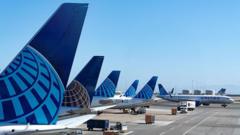More than 3,200 Boeing defence workers initiated a strike on Monday, representing a significant challenge for the troubled aviation giant. The strike involves employees in Missouri and Illinois, who are responsible for constructing F-15 fighter jets and various military aircraft. Workers voted against Boeing's latest offer, which included a proposed 40% average wage increase, citing issues related to pay, work schedules, and pensions as key reasons for their dissatisfaction.
Boeing's vice president of Air Dominance, Dan Gillian, expressed disappointment over the rejection of the proposal, which he believed would have benefited the workers. The strike was organized by the International Association of Machinists and Aerospace Workers (IAM), based in St. Louis, where Boeing’s defence operations are concentrated. The union characterized the strike as a demand for respect and dignity in the workplace, emphasizing that "3,200 highly-skilled IAM Union members at Boeing went on strike at midnight because enough is enough."
This walkout is notably the first involving Boeing's defence division since 1996, a period during which operations were halted for over three months. Although the strike is significant, Boeing's CEO, Kelly Ortberg, attempted to downplay its potential impact, suggesting that the current strike would be substantially smaller in scale compared to a previous walkout involving around 30,000 workers in the passenger jet sector, which resulted in considerable financial losses for the company.
Boeing has been navigating a turbulent landscape in recent years, with a history of safety concerns and operational setbacks, including two tragic crashes that claimed the lives of hundreds of passengers. The company delivered only 348 aircraft to clients last year, marking its lowest production rate since the onset of the pandemic, and raising pressing questions about its future resilience.
As the strikes unfold, the aviation industry watches closely, pondering whether Boeing can overcome these persistent crises and reclaim its standing in a highly competitive market.


















